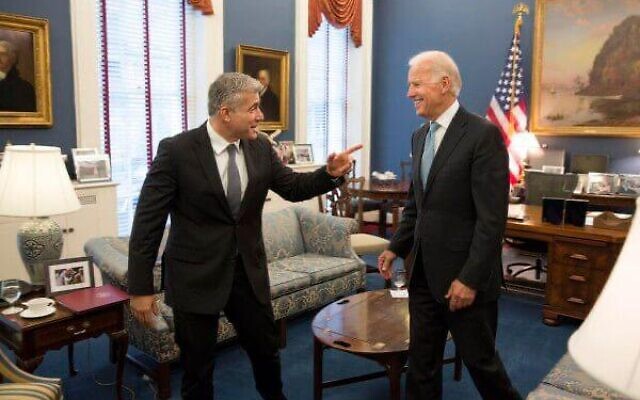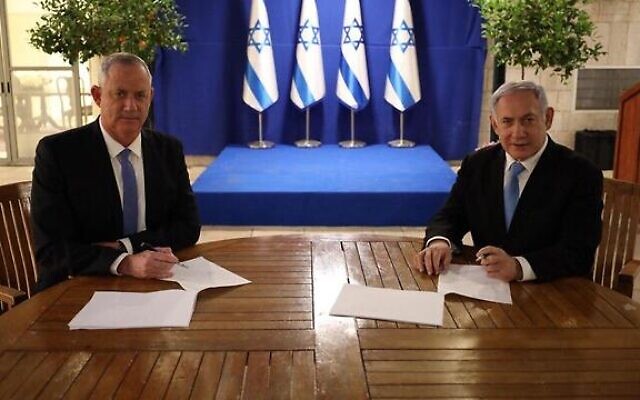
By David Horowitz
Times of Israel: Yair Lapid, the leader of the Israeli opposition, is certain he is ready to become prime minister. He has the qualities, he says. He has the experience.
But there’s something “way more important” at stake in the March 23 vote: The imperative to “say our farewells” to Benjamin Netanyahu.
Lapid argued, for three elections in succession, that the prime minister was a danger to Israeli democracy. Now, just ahead of the fourth, Netanyahu is in mid-trial, and Lapid believes that, if he is reelected, the Likud leader will move to cancel that trial — by pushing through legislation, effective retroactively, under which a serving prime minister cannot be prosecuted. He believes Netanyahu will drastically curb the power of the courts. He believes Netanyahu will turn Israel into an “illiberal democracy… Not a dictatorship,” but “an in-between, a hybrid, anywhere between Hungary and Turkey.”
And with stakes that high, Lapid says, he is willing to put aside personal ambition. “To me, this is a national emergency,” Lapid told The Times of Israel in an interview. “And I’ll do everything that’s needed to make sure there is a transfer of government in this country.
“Unlike [Yamina leader Naftali] Bennett, who is hesitant about it, unlike those who are preconditioning it, I’m saying it so clearly that I’m being accused of not being personally ambitious enough,” Lapid said. “Which is a first for me.”

The Yesh Atid leader is well aware that the prime minister is working to depict the election as something of a head-to-head contest between them. Netanyahu is trying to draw votes away from rival right-wing parties Yamina and Gideon Sa’ar’s New Hope and back to Likud by making the argument that the electorate faces a simple, fateful choice between his ostensibly patriotic “national camp,” reliably tough on Iran and the Palestinians, and the purportedly weak, naive left led by Lapid. In the last two elections, a vote for Yisrael Beytenu’s Avigdor Liberman, the first hawkish party leader to join the anti-Netanyahu camp, was a vote for the left, Netanyahu claimed. Now, says Netanyahu, a vote for Liberman, or for Bennett, or for Sa’ar, is a vote for the left, a vote that brings Lapid a step closer to power.
But Lapid is doing his best to deny Netanyahu that narrative. “I’m not willing to give Netanyahu the head-to-head kind of fight he wants to have with me,” he said in our interview. “He’s trying to [focus on me] as a way of avoiding his real weak spot, which is the kind of government, the only kind of government, he could put together, which is the government of [United Torah Judaism’s Yaakov] Litzman, [Shas’s Aryeh] Deri and [Otzma Yehudit’s Itamar] Ben Gvir. Tell me, who in that government represents working people?… Who represents working for the general public rather than blackmailing the country for your own sectors? No one.”
Lapid was not willing to get ahead of things and go into detail about the specifics of a non-Netanyahu coalition, only to say that he would not serve in a government together with Ben Gvir, and that he would be willing to discuss partnerships with any other parties that would accept his core principles.

He said he thinks Bennett “deep down inside” wants to serve under Netanyahu, and will be pressured to do so by his own supporters if the electoral math means Yamina has the post-election kingmaker role.
And he responded in some detail to the narrative his former Blue and White ally Benny Gantz set out in a Times of Israel interview last week regarding why Gantz agreed to partner with Netanyahu a year ago. “I admit to being a bit fed up talking about Benny Gantz. He made his own choices in life. We should go forward with ours,” the usually genial Lapid said tetchily when on this subject. “In a weird way, even though I went into the opposition, it seems like he has a beef with me, instead of me having a beef with him.”
Since Netanyahu is trying to “left shame” him, ToI also asked Lapid to set out his positions on issues including the Palestinian conflict, the ICC war crimes probe, relations with the US and Diaspora Jewry, and non-Orthodox conversions.

He explained why he considers himself a centrist, and said he “couldn’t care less” about Netanyahu’s efforts to misrepresent him. “When somebody, even somebody as skilled as Netanyahu in the art of propaganda, says something about you which is so untrue, then it’s irrelevant.”
The interview was conducted on Thursday at Yesh Atid’s offices in Tel Aviv. We spoke in English. What follows is a lightly edited transcript.
The Times of Israel: Unlike a year ago, when Benny Gantz was leading Blue and White, including your Yesh Atid, and was scrambling for a possible majority, the polls right now show there is a clear majority against Netanyahu. Parties could slip under the threshold, and the number could fall. But it’s about 70 seats.
Yair Lapid: Yes, with Bennett.
Yes, 70 including the parties led by people who say that they should be prime minister and he shouldn’t, whatever their particular formulations. And yet there’s no sense that Netanyahu is heading for defeat. How do you see it?
Take this into account: My son was born in 1995. Bibi [Netanyahu] was first elected in 1996. My son grew up, went to high school, met a young lady, they got engaged, they broke off the engagement, he went to the army, he served three years, he left the army, he started university, he’s now finishing his first degree. And Netanyahu is still the prime minister.
After all that time, it is so hard for people even to imagine Bibi not being the prime minister, that it sets a tone.
And yet, that tone is unlike what is really happening. And what is really happening is that there is a majority of Israelis who say enough is enough.
But the anti-Netanyahu politicians themselves, while arguing that this man is so dangerous and so terrible for Israel that he has to go, are not saying, We all have to get together and make sure that we achieve the key imperative of ousting Netanyahu. Bennett is off in one direction, dissing you and saying he won’t sit with you. The Arab parties are still forbidden, although Netanyahu wouldn’t rule them out if he was in a similar situation. While 58 percent said in last week’s Channel 13 survey that they don’t want Netanyahu to stay on as prime minister, we don’t see the political leaders acting concertedly to reflect that will.
We need to say our collective farewells to Netanyahu. And I’ll do everything that’s needed to make sure there is a transfer of government in this country
I’m not sure I’m the right address for this, because I have been very clear, not to say blunt, in saying what we need to do. To me, this is a national emergency. We need to say our collective farewells to Netanyahu. And I’ll do everything that’s needed to make sure there is a transfer of government in this country. Unlike Bennett, who is hesitant about it, unlike those who are preconditioning it, I’m saying it so clearly that I’m being accused of not being personally ambitious enough — which is a first for me.
I’m saying there’s something that is way more important [than my personal ambitions]. I really think that if Netanyahu is re-elected, with the kind of government he’s trying to structure, we are moving into dark times in this country.
So, very specifically, if the polls are more or less right, do you see the 70 or so seats enabling a majority, enabling a coalition, without him?
Yes.
How? Tell me how that works.
I won’t. I am way too experienced to speculate about what is going to happen before I see the real results. Because it always varies. The numbers within this anti-Netanyahu bloc are going to change.
If I win 23 seats with Yesh Atid, I know exactly what’s going to happen. It’s going to be a great government. But since I don’t know the election result, I’m not willing to discuss it. Answering hypothetical questions is an idiotic thing to do if you are a politician, or if you’re doing anything else for that matter.
In your potential alliances, where do you and the Haredim go?
I don’t know.
Are there people you’re not prepared to sit with?
Yes.

Who?
The Ben Gvir group [from the Otzma Yehudit faction].
Do you mean the entire Bezalel Smotrich Religious Zionist Party [of which Ben Gvir’s Otzma is a part]?
Yes.
But everybody else could be a partner?
With everybody else, including the Haredim, I’m prepared to talk. Whoever agrees on the basic principles of this government, I’m willing to discuss it with them.
They know, as the Israeli public knows, I am not to be blackmailed. I’m not to be pushed around. That is credit I have with the Israeli public, which I’ve earned with blood, sweat and tears. But aside from that, I’m willing to discuss everything with everybody, because we have a goal. And the goal is a) as I said, to say our farewells to Netanyahu and b) to form a government that will deal with the real issues that we have in this country, which are mostly the pandemic and the economy right now.
You seem to be avoiding turning this election into a battle between you and Netanyahu?
I’m not willing to give Netanyahu the head-to-head kind of fight he wants to have with me. He gave a speech yesterday. I tweeted that even my wife doesn’t speak that much about me. He’s trying to [focus on me] as a way of avoiding his real weak spot, which is the kind of government, the only kind of government, he could put together, which is the government of Litzman, Deri and Ben Gvir.

Tell me, who in that government represents working people? Who represents governance? Who represents working for the general public rather than blackmailing the country for your own sectors? No one. So this is his weakest point. This government that he talks about, the “government of the right,” has nothing to do with the right. It’s mainly based on parties that are declaredly non-Zionist. This is his problem.
In complete contrast to this, I’m willing to form a government with whoever is willing to work for the people of Israel.
To sum this up: The first imperative is to see the back of Netanyahu. Second, you’d like to be prime minister. That’s the one, two? Being prime minister is not more important to you than a group of parties that together can build a coalition without Netanyahu.
I understand politics as a tool to an end. I think I’m ready, I think Yesh Atid is ready. I think we have all the experience and qualities that are needed to run the country. And of course I want to be able to form the next coalition. But to me, the most important thing is what kind of a coalition it is and what kind of values it has.
A lot will depend on how big Yesh Atid is. But basically I’m not obsessed with my own position in this. I’m willing to discuss everything, but I have to see the results.
I’m not willing to run from one studio to another and badmouth my opponents. It seems like a bad idea in the midst of a national crisis. And besides, there are so many people involved in the politics of smearing who are so much better at it than I am
There’s a sense that you’re running an understated campaign, that you’ve been quite quiet. We’re barely two weeks from the elections. You say Netanyahu is trying to make this about you and him, and you don’t want to make that easy for him. What is the campaign strategy?
We are sitting in an interview right now. But I’m deliberately not participating in this reality show that politics has become. Netanyahu has made politics a reality show. I’m not willing to run from one studio to another and badmouth my opponents. It seems like a bad idea in the midst of a national crisis. And besides, there are so many people involved in the politics of smearing who are so much better at it than I am.
Aside from that reality show approach, I’m doing everything to campaign effectively. I’ve talked to tens of thousands of people through big Zoom meetings. I’m running around like crazy because Yesh Atid is one of the only two parties in Israel that has a real field operation.
The other being Likud?
That’s a very different field operation. Likud’s is based mostly on people who hold government or local government jobs. If Likud is not in power, they might lose their jobs, which is a strong incentive [to be active in the field]. Our activists are volunteers who are there because they want to fight for a good cause. I’m preoccupied with this. I’m also doing a lot of Russian, Arab, English media. I’m doing everything that needs to be done.
I hesitate to go back to a year ago, but I think we should. Sixty-one people recommended Gantz, the leader of the alliance that you were part of, to be prime minister. He was charged with forming a coalition and he has a narrative that says he just couldn’t do it.
It runs like this: He only had 58 MKs backing him when push came to shove. He didn’t want to send Israel to new elections. If you guys had come into the coalition with him, they would have been even more effective. But he was still effective. He’s restrained Netanyahu. You guys in opposition have done nothing. He did the best he could, and he’s being blamed unfairly.
Address that. Tell me how you see what happened in March, April, May of last year?
Let us examine his narrative first. If he was there to restrain Netanyahu, how come he voted against establishing an investigative committee for the submarine scandal? How come he voted against term limits for the prime minister? How come he voted against the bill that says a prime minister who has been indicted cannot continue in office? How come he voted against everything that we were signed on in our platform, from welfare to unemployment pay for people with small businesses?
If he was there to restrain, he restrained nothing.

He would say he was constrained in what he could do once he was in the coalition, but still he did some very important things.
Yes. And that is why I’ve said you don’t fight corruption from within. If you are in, you are in.
And besides, what he started with is just wrong. We had 61 votes to appoint the Speaker of the Knesset. We had 61, which was even more important at the time, for the bill that says the prime minister cannot serve when under a criminal indictment. We could have passed this law. There was across-the-board support.
At what stage was that? Before he decided to join a Netanyahu-led coalition?
Before, yes.
And practically, that could have been done? In other words, legislation could have been passed before a government was sworn in, during the transitional government?
Gantz actually wanted to go into Netanyahu’s government after the second election [in September 2019]. I just denied him the option… The truth of the matter is he just wanted to sit under Netanyahu
Yes. We passed a lot of legislation.
And besides, it’s no secret by now that he actually wanted to go into Netanyahu’s government after the second election [in September 2019]. I just denied him the option. Then he promised that he now understood it was the wrong idea and he wouldn’t do it. Otherwise, we wouldn’t have run together in the third election [last March].
The truth of the matter is he just wanted to sit under Netanyahu.
I admit to being a bit fed up talking about Benny Gantz. He made his own choices in life. We should go forward with ours. In a weird way, even though I went into the opposition, it seems like he has a beef with me, instead of me having a beef with him.

Are there parties that are running now — not just Gantz’s — that you say now should not be doing so? Should Meretz, Gantz, Yaron Zelekha’s New Economics Party, be dropping out now? Do they risk handing Netanyahu victory again? Or is there a decision to be made closer to Election Day?
First of all, Zelekha of course is not going to pass the threshold. And so it’s irresponsible for him to run.
I do my research more thoroughly than the TV polls.
Your data is more accurate than the TV polling data?
Yes. for a start, we poll four to five times as many people as the TV polls do. Meretz is going to clear the threshold, no problem. Labor is going to clear the threshold, no problem. Gantz, I’m not sure he’s going to pass the threshold because he’s got four seats on average, but three of them are undecided. I never saw anything like it in my life, and I’ve been in politics for quite a while. Usually, when a party shrinks, the support that remains becomes more solid. Here, three of Gantz’s four seats are not that solid.
The TV polls suggest he’s at around five. You’re saying your data is that he’s around four? And that it doesn’t seem that these four are solid? But are you saying he should drop out?
He has to make his own decision. Responsible people who tell the Israeli public that the most important thing right now is to make sure that Netanyahu doesn’t stay in office should make responsible decisions. Take another day or two, take another week. It’s fine. But try not to be too late.
You say the key reasons Netanyahu has to go are related to the pandemic and the economy. On COVID, can’t it be argued that he’s done well? You said you didn’t think the vaccines would be here as early as he got them…
Me and the Ministry of Health and the minister of health and the FDA and Pfizer said there wouldn’t be vaccines in January. Luckily for all of us, there were.
It could be argued he’s handled the vaccination side of the pandemic pretty well.
That’s not going to be argued by the 5,700 people who died. They’re not going to argue that he handled it well, considering the fact that in Cyprus, just next door to us, there’s only 230 dead.
You don’t buy the “island” argument, that it’s easier to close down an island?
We are an island. We don’t have open borders with our neighbors. Israel can be closed down by closing one airport. In Cyprus, they have two.
If we were vaccinating Palestinians, maybe.
The Palestinians do not cross the border, as we know. And no one claims that the number of dead people here in Israel has to do with the Palestinians.
Should we be vaccinating the Palestinians if we have enough vaccines?
If we have enough? Sure, why not? Israelis first. But we don’t want people to die.
Let’s come back to Netanyahu, and why you say he must go. You spoke of his handling of the pandemic and the economy. The pro-Netanyahu argument is that he keeps this country safe, he’s a figure on the world stage articulating Israel’s cause. The negative argument is that he’s a danger to our democracy, somebody whose corruption concerns are skewing his decision-making. You don’t raise and share those concerns?

Of course I do. The way he has handled the pandemic, the way he handles the economy, are a result of the political corner he’s in because of his indictment. The reason that he didn’t enforce the law on the Haredim, the reason that he didn’t close the airport, the reason that he formed a government of 36 ministers in the middle of a pandemic, the reason that he has a coronavirus cabinet of 15 or 16 ministers — instead of four: it should be the prime minister, the health minister, the finance minister and the minister of defense — the messy way he manages all this, are all a result of the spot he’s in. It all stems from his legal issues, and from the fact that he cares more about not going to jail than running the country.
And on top of this, in the midst of the pandemic, he also went to the Knesset asking for a million shekels in tax benefits…
This is all so detached from real people with real problems. It all shows why it’s so important that we have term limits in this country.
The High Court decision that non-Orthodox conversions to Judaism are acceptable for citizenship purposes may not directly affect many people, but seems significant because it gives a formal status in Israel for the first time to non-Orthodox Judaism. What’s your take on that? The ultra-Orthodox argument is that this is the beginning of a slippery slope, and then you lose track of who is “genuinely” a Jew and create a disaster for generations.
I’ll try to give you a different perspective on this. The most alarming thing was, of course, that the prime minister kept quiet. And the reason he kept quiet is because he is being held hostage by the ultra-Orthodox, and by Ben Gvir and so on.
Sooner or later he will have to say something about it, because there will be a demand from his partners. And since he is being held hostage by them, he will say that this [court ruling] is wrong.
And that puts us on a terrible road, to a clash with the majority of American Jews. Those American Jews, in turn, are a very strong group within the Democratic Party and Netanyahu is already in trouble with the Democratic Party. I’ve told him this so many times over the last three, four years. And this Democratic Party is now ruling the White House, Congress and Senate.

We’re in a period now where the world is going to look again at the threat of a nuclear Iran, and all the other security issues. And we are in danger of losing our Archimedic ladder — which is American Jews — on the new administration at this most sensitive time.
All because Netanyahu cannot say to his partners, Listen, this is a High Court ruling, and it happens to be a just one, because it cannot be that Israel is the only Western country in which Jews do not have freedom of religion. He cannot state this very obvious truth about what just happened.
Benjamin Netanyahu is by no means the leader or the prime minister of the Jewish people. He’s the prime minister of half of Israelis, and that’s it
You talk about this in terms of big American politics. But it’s also very important in respect to Diaspora Jewry itself. It’s the Western Wall compromise, part II. He scrapped that agreement, to the horror of much of Diaspora Jewry.
[Ariel] Sharon used to say, and others too — [David] Ben-Gurion and [Menachem] Begin felt this way — that he is not only the Israeli prime minister, but also the leader of the Jewish people. Benjamin Netanyahu is by no means the leader or the prime minister of the Jewish people. He’s the prime minister of half of Israelis, and that’s it. Now, this is part of the dangerous path he took in the last few years.
Israel should be the capital of world Judaism, and it cannot be under his rule. That’s not good in terms of relations between Israel and the Disapora.
You’ve said to me in the past that he’s a danger to our democracy. He’s on trial now. Where do you see that danger coming?
If he does get re-elected, with his kind of coalition, there is going to be a “French law” [under which a prime minister cannot be tried while in office] and he’ll cancel his indictments.
A retroactive law that stops his trial?
Yes. And then we become — I think the phrase was coined by [Hungary’s] Viktor Orban — the illiberal democracy. Which is just a nicer way of saying not a democracy.
Sheldon Adelson used to tell him it’s not really important for Israel to be a democracy. The most important thing is for Israel to be a strong Jewish state. And he bought into it.
So to him, it’s not a great loss if we’re not a democracy. There are so many other countries in the world that are not. It’s not a dictatorship, it’s an in-between, a hybrid, anywhere between Hungary and Turkey.
And what will become of the judiciary, of the courts?
They will crush them, of course.
Deny them the right to intervene on legislation and government decisions?
Yes. And the separation of powers will be ended. That’s where he’s heading.
The polls suggest that the support of your ex-buddy, ex-brother, Naftali Bennett, is the only mathematical means by which Netanyahu can retain power. Perhaps your polling data suggests something different. If Bennett does not go with him, then he can’t reach a majority, it would seem.
Unfortunately, I do not trust Bennett not to go with Netanyahu. I’ve seen them together. I’ve seen how afraid Bennett is of him. It has nothing to do with politics. It’s just the relationship. I think Bennett will go with him. He’s going to be under huge pressure from his own constituency or part of his own constituency, and it will be very convenient for him to cave in to this pressure. It’s invited pressure.
I don’t trust Bennett not to go with Bibi, because deep down inside he really wants to go with Netanyahu and be under his wing
I don’t want to make predictions, because it doesn’t make any sense to do so at this point. But right now, we have 61 without Bennett. If we end up with 61 without Bennett, then Bennett will come with us. But I don’t trust Bennett not to go with Bibi because deep down inside he really wants to go with Netanyahu and be under his wing. Which is scary to me.
What is it like to be “left shamed”? Bibi is trying to turn you into a shameful ally for the Sa’ars and the Bennetts, and they both seem to have succumbed. How do you define yourself? As a centrist?
A centrist.
Not center-right and not a center-left?
A centrist. Centrism is not a geometrical point between right and left. It’s a world view.
So what is it like to be “left shamed”?
I couldn’t care less. When somebody, even somebody as skilled as Netanyahu in the art of propaganda, says something about you which is so untrue, then it’s irrelevant. More than anything else, it shows him to be out of date because it’s yesterday’s struggle.
Except it has worked on Bennett, right now.
For Bennett and Sa’ar, who see themselves as prime ministerial candidates, the idea that Netanyahu is helping them get rid of somebody who’s doing better than they are in the polls is pretty appealing. So they’ve used it, although Sa’ar already backed off a little. It’s fine.
Explain what makes you a centrist, on issues related to the Palestinians, for example.
Asking me why I’m not a leftist is like asking somebody why they’re not tall. Well, I’m not!
It’s not a criticism, on either of those! I’m just asking you to define yourself.
The Palestinians want to destroy us more than they want to build a nation. And as long as this is the situation, there will be no two states
On the Palestinians, I differ from the Israeli right because I believe in the two-state solution. I differ from the Israeli left both because I’m a security hawk and because I do not believe in the end-of-conflict theory. We will never divide Jerusalem, because it’s our capital. We will never agree to the “right of return”. I see no reason to negotiate on these issues with the Palestinians because it’s useless, as they’ve proven so many times.

And there’s also an emotional element: I don’t think we are to blame for the failure of every former negotiation. The Palestinians want to destroy us more than they want to build a nation. And as long as this is the situation, there will be no two states.
But what I want to have is two states, one demilitarized, one the strongest in the Middle East, with that [unresolved] conflict about Jerusalem and about the right to return. We’re going to have this conflict for two or three hundred years, and then we’ll see about it.
I think that’s more practical. I think even the Palestinians can live better with the idea that they didn’t compromise on Jerusalem, that they didn’t compromise on the right of return, and instead they made this into an open conflict between the two states.
What’s your stance on the ICC probe?
To hell with them.
Let’s see the ICC dealing with the half-million people who died in Syria or the people who are being hanged in Iran. It’s just a BDS-pushed, anti-Israel, radical left agenda that the prosecutor [Fatou] Bensouda is leaving behind on her way out.
Besides, we are not part of the ICC. They have no jurisdiction over us.
But it could have practical consequences, with Israeli officers, soldiers, politicians facing arrest.
We have to push back. I was happy to see that [US Secretary of State] Antony Blinken already said he’s against this ruling.
It is biased. The motives are pure anti-Semitism. There’s no other way to explain, for example, why they’re not dealing with Syria, but they’re dealing with the only democracy in the Middle East. I’m unhappy about it, and angry.
ATTENTION READERS
We See The World From All Sides and Want YOU To Be Fully InformedIn fact, intentional disinformation is a disgraceful scourge in media today. So to assuage any possible errant incorrect information posted herein, we strongly encourage you to seek corroboration from other non-VT sources before forming an educated opinion.
About VT - Policies & Disclosures - Comment Policy




